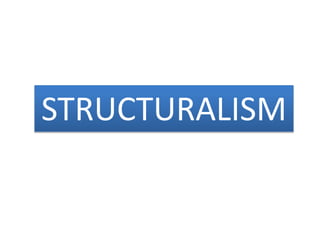Structuralism
•Download as PPTX, PDF•
5 likes•691 views
Sarfraz Ahmad Lecturer KUST Kohat
Report
Share
Report
Share

Recommended
More Related Content
What's hot
What's hot (20)
Schools of Psychology - Structuralism, Functionalism, Behaviorism, Gestalt Ps...

Schools of Psychology - Structuralism, Functionalism, Behaviorism, Gestalt Ps...
More from Sarfraz Ahmad
More from Sarfraz Ahmad (20)
Structuralism
- 2. STRUCTURALISM Introduction • Structuralism is the name that is given to a wide range of discourses that study underlying structures of signification. • Signification occurs wherever there is a meaningful event or in the practice of some meaningful action. • Structuralism therefore promises to offer insights into what makes us the way we are.
- 3. STRUCTURALISM • Structuralism was a school of thought that sought to identify the components (structure) of the mind (the mind was the key element to psychology at this point). • Structuralists believed that the way to learn about the brain and its functions was to break the mind down into its most basic elements. • They believed, the whole is equal to the sum of the parts.
- 4. STRUCTURALISM • Wilhelm Wundt, who is considered the pioneer Structuralist, set up the very first psychological laboratory in 1879. • TItchner was interested in the conscious mind. He used a technique called introspection to try to understand the conscious mind. • Introspection is a process of having a person "look inward", focus on, and try to understand the emotion or thought they are experiencing at that moment.
- 5. STRUCTURALISM • Structuralism was the first school of psychology • focused on breaking down mental processes into the most basic components. • Researchers tried to understand the basic elements of consciousness using a method known as introspection • Wilhelm Wundt, founder of the first psychology lab
- 6. STRUCTURALISM • Edward B. Titchener, who first coined the term to describe this school of thought. • Wundt's work helped to establish psychology as a separate science • He contributed methods to experimental psychology, • Wundt himself referred to his view of psychology as volunteerism • His theories tended to be much more holistic than the ideas that Titchener later introduced in the United States.
- 7. STRUCTURALISM • Titchener's development of structuralism helped establish the very first "school" of psychology, but structuralism itself did not last long beyond Titchener's death.
- 8. STRUCTURALISM Criticism • To study the structures of the mind were too subjective • The use of introspection led to a lack of reliability in results. • It was too concerned with internal behavior, • It is not directly observable
- 9. STRUCTURALISM Criticism • It can not be accurately measured. • Structuralism is important because it is the first major school of thought in psychology. • The structuralist school also influenced the development of experimental psychology.
